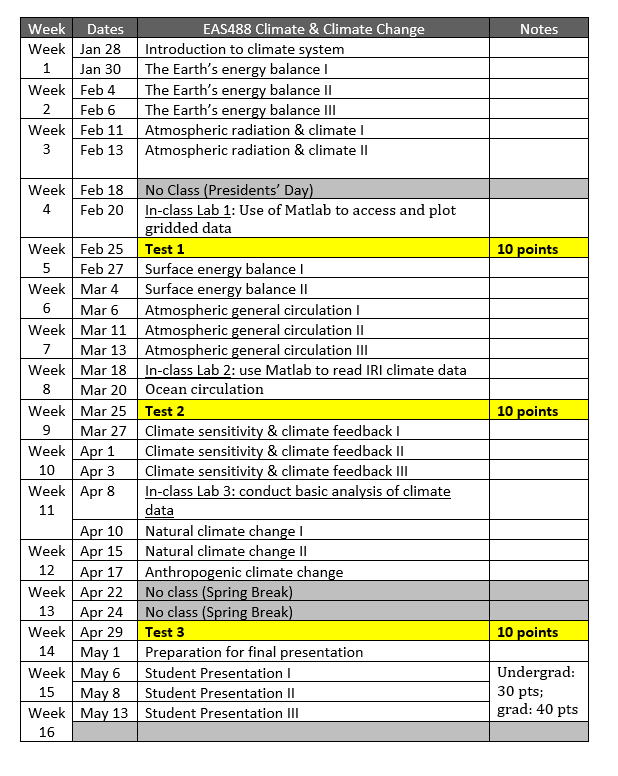Spring 2019. Subject to refinement/updating.
Instructor: Johnny Luo
Schedule: Monday, Wednesday 2:00 p.m. to 3:15 p.m.
Location: Marshak MR044
3 credits 3 hours/week
Instructor
Professor Johnny Luo
212-650-8936
luo@sci.ccny.cuny.edu
Office hours: after class (3:30 p.m. to 4:30 p.m.) or by appointment
Class website: http://www.sci.ccny.cuny.edu/~luo/EAS488
Description
This class is intended to introduce to students the modern study of the Earth’s climate system – Climate Science. Climate Science has evolved rapidly in the past decades and has become a “melting pot” of a number of disciplines including meteorology, climatology, oceanography, hydrology, etc. New observation and analysis tools have also been developed, the most notable of which are Earth-orbiting satellites and global climate models. In this class, students will learn the fundamentals of the Earth’s climate system and will then move on to study how climate changes. Students will also learn to use a programming language (e.g., Matlab) to analyze climate data.
Objectives
- Describe different components of the climate system
- Describe factors affecting global energy balance; be able to use Matlab to calculate and plot solar insolation as a function of time and latitude.
- Understand solar and IR radiation transfer through the atmosphere; Apply the radiative transfer knowledge to calculate surface temperature under radiative-convective equilibrium (using, for example, a 2-layer model)
- Describe various circulations of the atmosphere (e.g., Hadley Cell) and the Ocean (e.g., Thermohaline circulation)
- Understand climate sensitivity and climate feedback; be able to analyze different feedback mechanisms (e.g., water vapor feedback, ice albedo feedback, etc.)
- Describe various natural (e.g., orbital variations) and anthropogenic climate forcing mechanisms (e.g., increasing greenhouse gasses); assess their importance in determining climate change.
Prerequisites: Please contact the instructor and MS in Sustainability Program Manager to express interest in the course. Some quantitative skills in math/physics and computer programming are required, and experience with software such as Matlab is highly desirable.
Required Reading
Textbooks:
(Required) Global Physical Climatology, by Dennis L. Hartmann, Academic Press, 2nd Edition, 2016.
(Suggested) Physics of Climate, by Jose Peixoto and Abraham Oort, Springer, 1992.
(Suggested for Matlab) Matlab Recipes for Earth Sciences, M. H. Trauth, Springer, 2010.
Grading
| Homework | 10% |
| In-class tests | 30% |
| Final project (presentation and term paper) | 40% |
| Final exam | 20% |
| Total | 100% |
Course Outline
Note: weekly plan may be subject to small changes, including dates.
Last Updated: 01/29/2024 10:43
